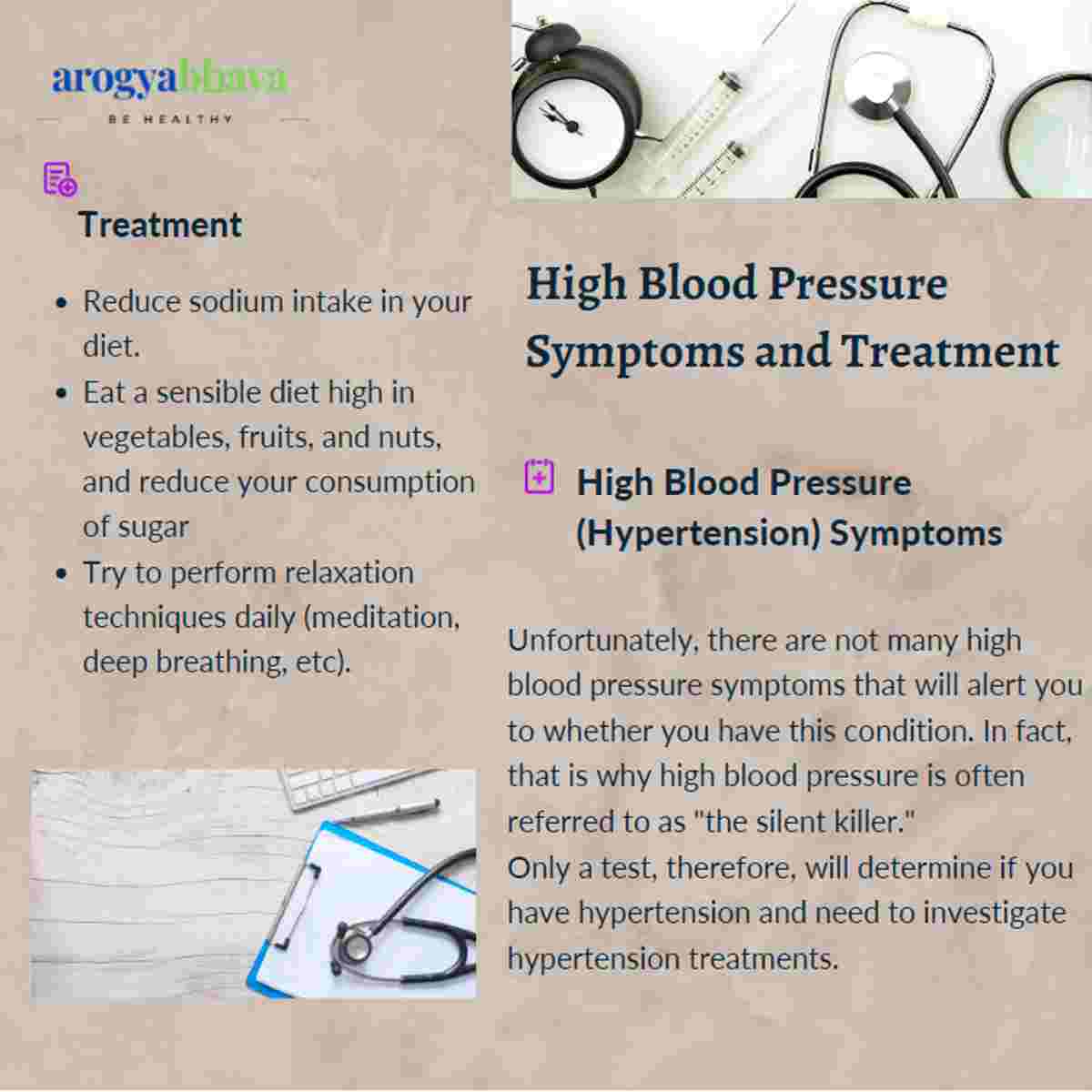High Blood Pressure Symptoms and Treatment

Before discussing hypertension treatments and symptoms, let’s simply define hypertension.
Hypertension is the medical term for high blood pressure. Although some specialists are now advocating that this recommendation should be lowered, which would put even more people in the high blood pressure category, chronic readings of 140/90 or greater are still seen as being too high.
Adults should have a score of 120/80, but some doctors now believe that readings as low as 115/75 can already increase the risk of heart disease and stroke.
The bottom number is referred to as diastolic and is a reading of the pressure while the heart is at rest. The top number is known as systolic pressure and denotes the force with which blood is pumped through the arteries by the heart when it beats.
One in four individuals in America, or 50 million people, are thought to have high blood pressure. It should come as no surprise that there is a high demand for hypertension remedies and information on the most widespread hypertension symptoms.
High Blood Pressure (Hypertension) Symptoms
Unfortunately, there are not many high blood pressure symptoms that will alert you to whether you have this condition. In fact, that is why high blood pressure is often referred to as “the silent killer.”
Only a test, therefore, will determine if you have hypertension and need to investigate hypertension treatments.
For those few people who do exhibit high blood pressure (hypertension) symptoms, the most commonly reported are headaches, lethargy, and tinnitus (ringing in the ears).
But these symptoms are also associated with many other possible conditions, not just hypertension, so it’s not wise to rely on them as a measure.
High Blood Pressure (Hypertension) Treatments
Although these are not medical high blood pressure treatments, many experts recommend these lifestyle changes:
- Reduce sodium intake in your diet.
- Even a few excess pounds can elevate one’s blood pressure. Eat a sensible diet high in vegetables, fruits, and nuts, and reduce your consumption of sugar. Studies have shown that mild to moderate hypertension can be benefited from such a diet.
- Try to perform relaxation techniques daily (meditation, deep breathing, etc).
Prescription Hypertension Treatments
There are many prescription medications available that are used to treat hypertension. If you are considering one of these, it is crucial that you thoroughly consult with your doctor. Many of these have potentially harmful side effects.
Natural Hypertension Treatments
According to world-famous Reader’s Digest, in their highly acclaimed tome The Healing Power of Vitamins, Minerals, and Herbs – “If you have mild hypertension, you may want to try lifestyle changes and supplements before turning to prescription drugs, which often have unpleasant side effects. Begin with a two or three-month trial with supplements. If your blood pressure drops, you can use the supplements indefinitely.”
For example, there is now a link between Omega-3 and high blood pressure.
Other high blood pressure natural remedies are discussed here.
The following nutritional supplements are also promising, often advocated by such experts as Naturopathic physicians
1. Crataegus oxyacantha (Hawthorn)
One of the most well-known natural treatments for high blood pressure, hawthorn is also known for its cardio-protective characteristics. Hawthorn works by widening blood arteries, which boosts the heart’s energy supply and enhances its capacity to pump blood. It accomplishes this by inhibiting the activity of the blood-constricting enzyme ACE (angiotensin-converting enzyme).
Therefore, hawthorn lowers blood pressure in people with chronically restricted arteries. Hawthorn’s anti-oxidant qualities also aid in preventing damage brought on by coronary artery plaque accumulation.
2. Passiflora incarnata
It is a well-known calmative herb that also relaxes blood vessels and reduces blood pressure.
3. Viburnum opulus (Guelder Rose bark)
It is a very effective cardiac tonic and muscle relaxant. It is known to relax the cardiovascular system and also relieve nervous tension, often associated with high blood pressure.
4. Ginkgo biloba
Ginkgo biloba is one of the oldest trees on the planet, dating back about 200 million years. It has survived mainly in Oriental temple gardens, where it is highly prized for its medicinal properties in Chinese Traditional Medicine.
Modern studies have demonstrated the significant effect that Ginkgo biloba has on the cardiovascular system, relaxing blood vessels, and acting as a circulatory stimulant and anti-inflammatory.
One of the most essential active ingredients, ginkgolide, has been clinically shown to be just as effective as standard pharmaceutical drugs in treating irregular heartbeats. Improving blood flow throughout the body, Ginkgo biloba can also reduce blood ‘stickiness’, which lowers the risk of blood clots.
The Arogya Bhava team suggest consulting with your doctor before using these herbs. This information is based on the best of the author’s knowledge only and can’t be treated as a medicinal opinion.